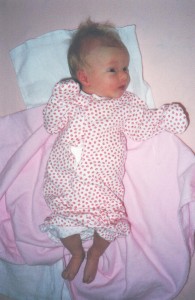My first months of motherhood were no doubt made more arduous because I had absolutely no previous experience with infants. While I’ve always enjoyed toddlers and preschoolers, I’ve never been drawn to babies, who appear frighteningly small and unfinished. When I got my own baby, I didn’t think I’d missed much.
The first hurdle was nursing, which brought with it a host of anxieties and difficulties (and conflicting advice by every nurse or lactation consultant at the hospital). Suddenly I was a machine (and an overworked and badly functioning one, at that), for feeding. All I did was nurse, worry about nursing, or try to recover from nursing, only to have to begin again. During that first week, I remember that my mother seemed to be constantly standing outside the bedroom door, holding a screaming, red-faced D. “It’s been three hours, and she’s hungry again.” I thought I had just dozed off. Once I got the hang of effectively feeding my baby, there was still the reality of it, the giving of myself endlessly to this tiny screaming tyrant. The word parasite flickered occasionally through my mind. There is great isolation in being a nursing mother.
Just as I had always suspected, a baby is an awkward, uncooperative little creature, as small as a doll, but totally lacking its reassuring complacency. A baby is an anti-social rebel. She doesn’t want to wear those diapers, that onesie, or that darling outfit from Aunt Claire. She especially hates those socks, and she rubs her feet together tirelessly until she works them off so they’re lost in the food court at the mall. She doesn’t want that bath. She can’t abide being locked into that straitjacket of a car seat. She fights against everything but food. Sometimes she even fights against food. For such a diminutive being, her screams are astonishingly ear-splitting.
I don’t blame her. I realize she’s uncomfortable, that she has no knowledge of social graces or expectations. She has no words to tell us what bothers her. The world outside the comfy, watery womb is filled with adversity, noise, frustration, and unanswered needs. I know she doesn’t enjoy the never-ending cycle of nursing, burping, spitting up, pooping and diaper changing any more than I do. I feel for my baby. I was much like her, as my parents have frequently told me. I cried most of the time, except when I held my breath and passed out. Still, empathy and understanding don’t make the whole mothering process run any more smoothly.
It gradually gets easier, though. Before long, the moments of wonder and joy begin to catch up with and even exceed those of annoyance and pain. The uphill climb is worth it, in a big way.

